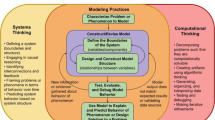Abstract
Systems Thinking can help to solve complex problems in different domains. For an engineering master’s program, we designed a seminar course to teach Systems Thinking. For the seminar we use qualitative models known as archetypes as conceptual models and the Covid-19 pandemic as problem context. In this paper we describe the course design and report findings from running it. Based on students’ evaluation and the materials they produced throughout the course, our findings (1) support our design assumptions regarding student motivation, (2) give hints on students’ struggling with Systems Thinking and understanding and applying archetypes in particular. With this we want to contribute to the discussion of how to teach Systems Thinking in Higher Education.
Access this chapter
Tax calculation will be finalised at checkout
Purchases are for personal use only
Similar content being viewed by others
References
Maani, K.: System dynamics and organizational learning. In: Dangerfield, B. (ed.) System Dynamics. ECSSS, pp. 417–430. Springer, New York (2020). https://doi.org/10.1007/978-1-4939-8790-0_543
Hossain, N.U.I., Dayarathna, V.L., Nagahi, M., Jaradat, R.: Systems thinking: a review and bibliometric analysis. Systems 8(3), 23 (2020)
Richmond, B.: Systems thinking: critical thinking skills for the 1990s and beyond. Syst. Dyn. Rev. 9(2), 113–133 (1993)
Sterman, J.D.: Business Dynamics Systems Thinking and Modeling for a Complex World. Irwin/McGraw Hill, Boston (2000)
Sweeney, L.B., Sterman, J.D.: Bathtub dynamics: initial results of a systems thinking inventory. Syst. Dyn. Rev. 16(4), 249–286 (2000)
Kapmeier, F., Happach, R.M., Tilebein, M.: Bathtub dynamics revisited: an examination of déformation professionelle in higher education: bathtub dynamics revisited. Syst. Res. Behav. Sci. 34(3), 227–249 (2017)
Plate, R., Monroe, M.: A structure for assessing systems thinking. Creative Learn. Exch. Syst. Dyn. Syst. Think. K-12 Educ. 23(1), 1–12 (2014)
Schaffernicht, M.F.G., Groesser, S.N.: A competence development framework for learning and teaching system dynamics. Syst. Dyn. Rev. 32(1), 52–81 (2016)
Kunc, M.: Teaching strategic thinking using system dynamics: lessons from a strategic development course. Syst. Dyn. Rev. 28(1), 28–45 (2012)
Richardson, G.P.: “Model” teaching. Syst. Dyn. Rev. 30(1–2), 81–88 (2014)
Richardson, G.P.: “Model” teaching II: examples for the early stages. Syst. Dyn. Rev. 30(4), 283–290 (2014)
Richardson, G.P.: “Model” teaching III: examples for the later stages. Syst. Dyn. Rev. 30(4), 291–299 (2014)
Wolstenholme, E.: Using generic system archetypes to support thinking and modelling. Syst. Dyn. Rev. 20(4), 341–356 (2004)
Senge, P.M.: The Fifth Discipline: The Art and Practice of the Learning Organization, 1st edn. Doubleday/Currency, New York (1990)
Wolstenholme, E.F.: Towards the definition and use of a core set of archetypal structures in system dynamics. Syst. Dyn. Rev. 19(1), 7–26 (2003)
Schwaninger, M.: Modeling with archetypes: an effective approach to dealing with complexity. In: Moreno-Díaz, R., Pichler, F. (eds.) EUROCAST 2003. LNCS, vol. 2809, pp. 127–138. Springer, Heidelberg (2003). https://doi.org/10.1007/978-3-540-45210-2_13
Atwater, J.B., Pittman, P.H.: Facilitating systemic thinking in business classes. Decis. Sci. J. Innov. Educ. 4(2), 273–292 (2006)
Maani, K.E., Maharaj, V.: Links between systems thinking and complex decision making: systems Thinking and Complex Decision Making. Syst. Dyn. Rev. 20(1), 21–48 (2004)
Tenberg, R.: Was ist Lernkompetenz und wie kann sie gemessen werden? Theoretische Grundlagen und empirische Bilanzierung über Lernstrategien im beruflichen Lernen. Zeitschrift Für Berufs- Und Wirtschaftspädagogik 105(4), 539–555 (2008)
Deci, E.L., Ryan, R.M.: Die Selbstbestimmungstheorie der Motivation und ihre Bedeutung für die Pädagogik. Zeitschrift Für Pädagogik 39(2), 223–239 (1993)
Prenzel, M.: Selbstbestimmtes motiviertes und interessiertes Lernen bei angehenden Bürokaufleuten. Eine Längsschnittstudie. In: Krüger, H.-H., Olbertz, J.H. (eds.) Bildung zwischen Staat und Markt, pp. 47–50. Leske & Budrich, Opladen (1997)
Author information
Authors and Affiliations
Corresponding author
Editor information
Editors and Affiliations
Rights and permissions
Copyright information
© 2022 The Author(s), under exclusive license to Springer Nature Switzerland AG
About this paper
Cite this paper
Tilebein, M., Wunderlich, J., Tenberg, R. (2022). Using Archetypes to Teach Systems Thinking in an Engineering Master’s Course. In: Moreno-Díaz, R., Pichler, F., Quesada-Arencibia, A. (eds) Computer Aided Systems Theory – EUROCAST 2022. EUROCAST 2022. Lecture Notes in Computer Science, vol 13789. Springer, Cham. https://doi.org/10.1007/978-3-031-25312-6_76
Download citation
DOI: https://doi.org/10.1007/978-3-031-25312-6_76
Published:
Publisher Name: Springer, Cham
Print ISBN: 978-3-031-25311-9
Online ISBN: 978-3-031-25312-6
eBook Packages: Computer ScienceComputer Science (R0)




